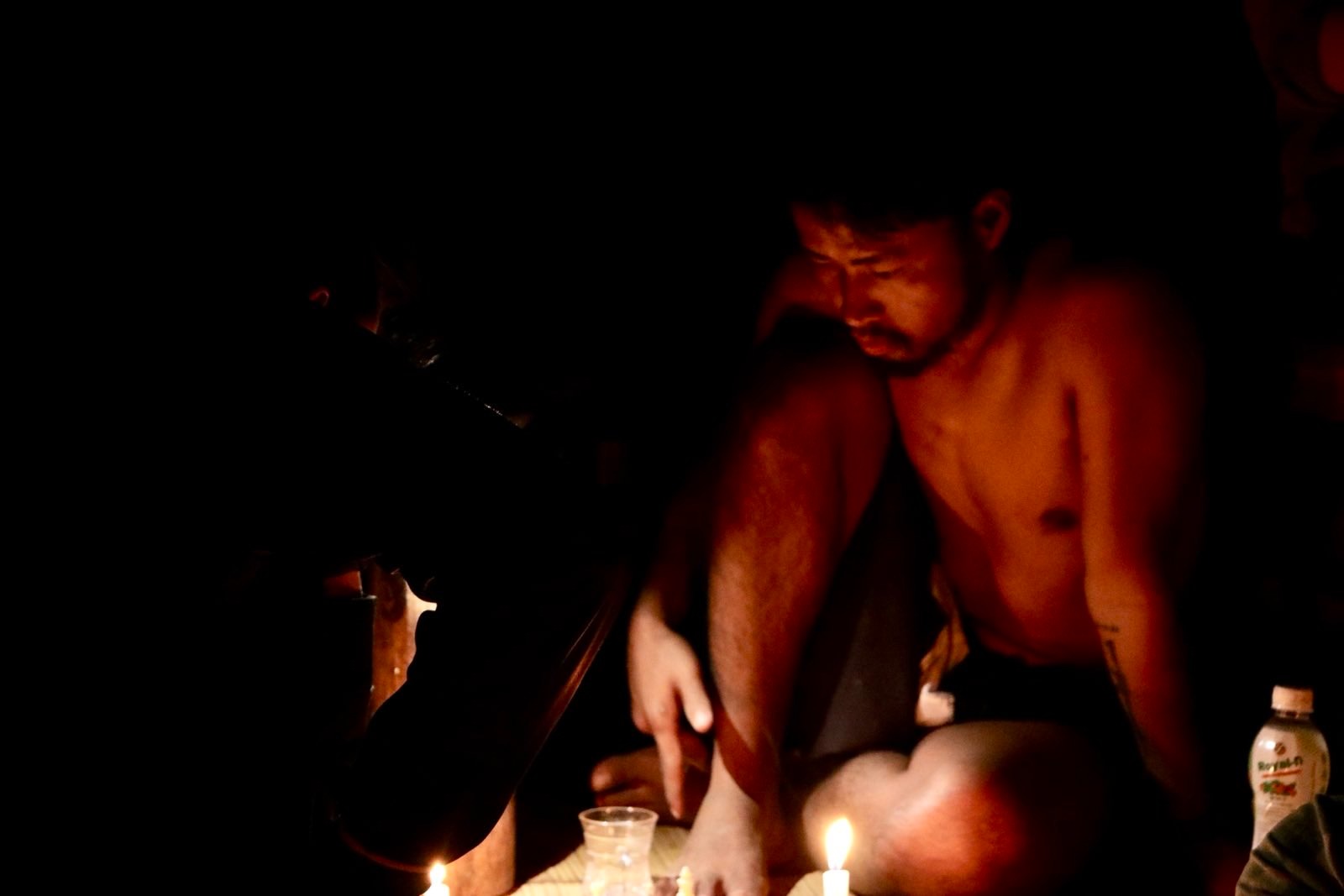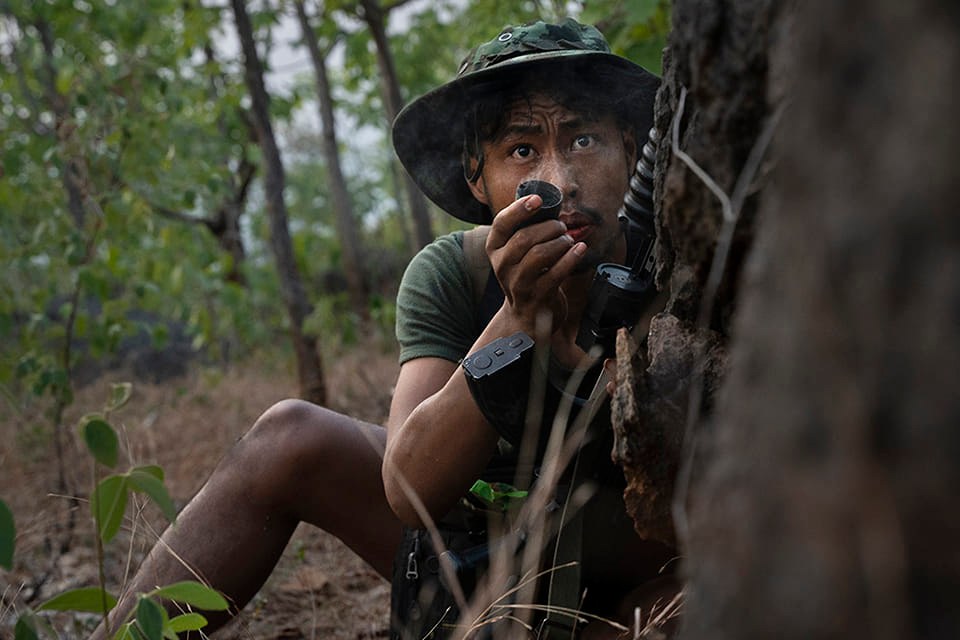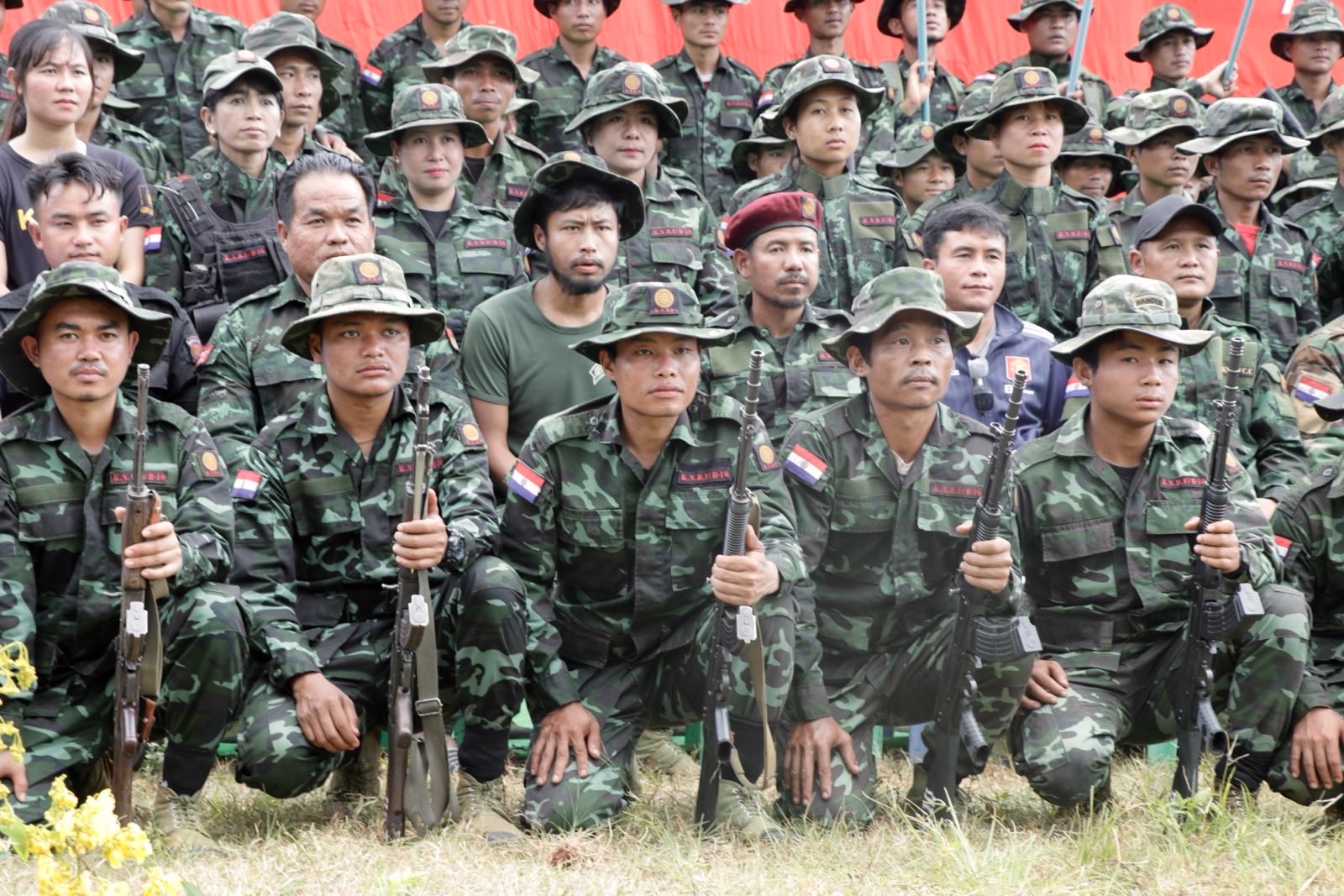Khu Reedu was playing chess with a comrade at a ramshackle hut somewhere in eastern Demoso, Karenni (Kayah) State when I first encountered him in November.
Wearing only football shorts, the Adjutant-General of the Karenni Nationalities Defense Force (KNDF) was concentrating hard as fellow KNDF members watched the game by candlelight.
The flickering flame illuminated a bearded man, tall and wiry, with an M-16 assault rifle tattooed on his left forearm.
Khu Reedu, also KNDF’s third secretary and chief of No. 6 Tactical Command, is described by close acquaintances as the quintessential soldier and resolute revolutionary. That reputation is borne out by his words, including his speech to mark the second anniversary of KNDF Battalion 10.
“If you fear death or killing, I ask you not to become a comrade. By killing, I mean killing for a righteous cause. You need courage to face the enemy. You must be bold enough to kill. Those who deserve to die must die.”
Childhood struggle
Now 27 years of age, Khu Reedu was born to a poor family in the Karenni State capital of Loikaw. He was forced to drop out in the eighth grade so that his sisters could go to school.
Although his parents are Buddhist, he also practices traditional Karenni beliefs.
In 2010 he arrived on the Thai border, where he continued his schooling at the Karenni National College opened by Karenni National Progressive Party. He graduated in 2014 and then worked as a teacher at No. 1 Karenni refugee border camp from 2015 to 2017. He had no specific ambitions at the time.
“I just wanted to be a regular person who worked for the community and the Karenni State,” he said.
From teacher to activist

He joined a local youth association and took part in demonstrations in Karenni State.
Under the now ousted National League for Democracy government, he joined protests against the Karenni State government’s plans to erect a statue of Myanmar independence hero General Aung San in Loikaw.
Khu Reedu was among six young activists who labeled then state chief minister L Phaung Sho and his finance minister Karenni traitors for erecting the statue.
The criticism saw him jailed in 2019 under the Law Protecting the Privacy and Security of Citizens.
Becoming a revolutionary
Khu Reedu said he was far from dismayed when the Myanmar military staged a coup in 2021.
“I was happy when I heard the military had seized power since otherwise young people would lose interest in political or military affairs and our state would suffer a setback,” he explained.
“Before, young people had only heard about coups, but now they have experienced one for themselves. I have to admit I was happy.”
Khu Reedu took part in protests against the coup. When the military unleashed a brutal crackdown on peaceful protesters, he and other protest leaders considered taking up arms against the regime. Two armed groups emerged out of the Karenni State Strike Committee.
“Military training was organized by [KNDF] chairman Khun Bedu and first and second secretaries Marwi and Ko Dede. I formed my group separately,” he said.
The two armed groups eventually merged into one, known as the KNDF.
Khu Reedu became the third secretary of the KNDF central committee and adjutant-general. When the KNDF formed battalions, Khu Reedu was appointed commander of KNDF Tactical Command No. 6, which is active along the eastern Loikaw-Demoso-Bawlake road.
Major battles fought

Khu Reedu is among the resistance commanders who have dealt severe blows to the regime in Karenni State. He has fought several fierce and decisive battles.
The first took place in May 2021, before the KNDF was formed. Khu Reedu’s troops ambushed a junta convoy carrying around 50 detained young protesters in Demoso Township. Armed with just a rocket-propelled grenade launcher, two modern rifles, and homemade hunting rifles, the group managed to destroy the three junta vehicles and free all the detainees. It was his first military victory.
Although a commander, Khu Reedu likes to lead from the front and bears the bullet scars to prove it. He came closest to death in a 2021 clash with junta troops.
“I was hit in the back of the head during the battle for Kyauksekan. We were attacked by junta soldiers while holding a meeting, so I decided to retaliate. It was the first battle in Karenni State in which the regime used a jet fighter. I was hit in the head. I didn’t receive proper medical treatment initially, and I was out of my mind for nearly a week.”
Khu Reedu rose to prominence as a Karenni commander during the three-month defense of Daw Tamagyi village.
In March 2023, two junta columns raided the area in eastern Demoso. Battalions under Khu Reedu’s command managed to repel the attacks, wiping out almost all of Light Infantry Battalion 515 in the process. A total of 138 weapons were seized from junta troops in the three-month battle, he said.
Khu Reedu is currently participating in Operation 1111 launched by allied Karenni resistance forces to seize the state capital, Loikaw.
A soldier who values tradition

Though an educated man of the 21st century, Khun Reh Du values his forefathers’ traditions. He is particularly interested in chicken bone divination, an ancient custom of the Karenni people.
Chicken bones even hang from the bamboo-thatched wall of his hut.
Karenni people read the bones to predict the success of harvests, health or business and to determine the most auspicious times for festivals, travel or starting an enterprise.
Khu Reedu likes to read them before planning military operations.
A 60-year-old man who shares the hut with Khu Reedu said the commander had consulted the bones during fierce fighting in Daw Tamagyi, praying for the safety of resistance fighters. None were harmed, even when the junta launched artillery strikes during the clash, he said.
Khu Reedu said he practices the rite only because it is Karenni tradition.
“The decision to carry out an attack does not depend on divination but on humans. If the fighters are not capable, they won’t succeed even if the reading points to success. It all depends on humans.”
Khu Reedu also has strong opinions on what a soldier should look like.
“I don’t like comrades wearing earrings or having dyed hair. I can’t stand the sight of comrades with earrings. Before sending them to the front line, I ask them if they can bear hardship or not.”
Military discipline also means displays of emotion are out of the question. Khu Reedu never sheds tears in public for comrades he has lost. He believes soldiers should grieve in private.
“We are not allowed to cry when our comrades die. You may moan in the dark alone. You should not show your tears to others. I feel that my responsibility increases every time a comrade dies.”
Perhaps this is why his comrades and other resistance fighters in Karenni State call him a typical soldier.
The strong-willed and plain-speaking man admits the revolution has taken a toll on his mental state.
“It is lonely. Some comrades who vowed to stick with me till the end have failed while others have left for various reasons. As time passes, I feel like I’ve been abandoned.”
For relief from the stress, Khu Reedu plays football, cane ball and chess.
Three years into the revolution, his troops’ major requirements are ammunition and money. He remains determined to defeat the junta’s army.
“We will fight until the end. Our hope is that we can all return home. Things will not be resolved if we just sit and do nothing. We will do what we must do. Only then will we reach the path to return home,” he said.

















